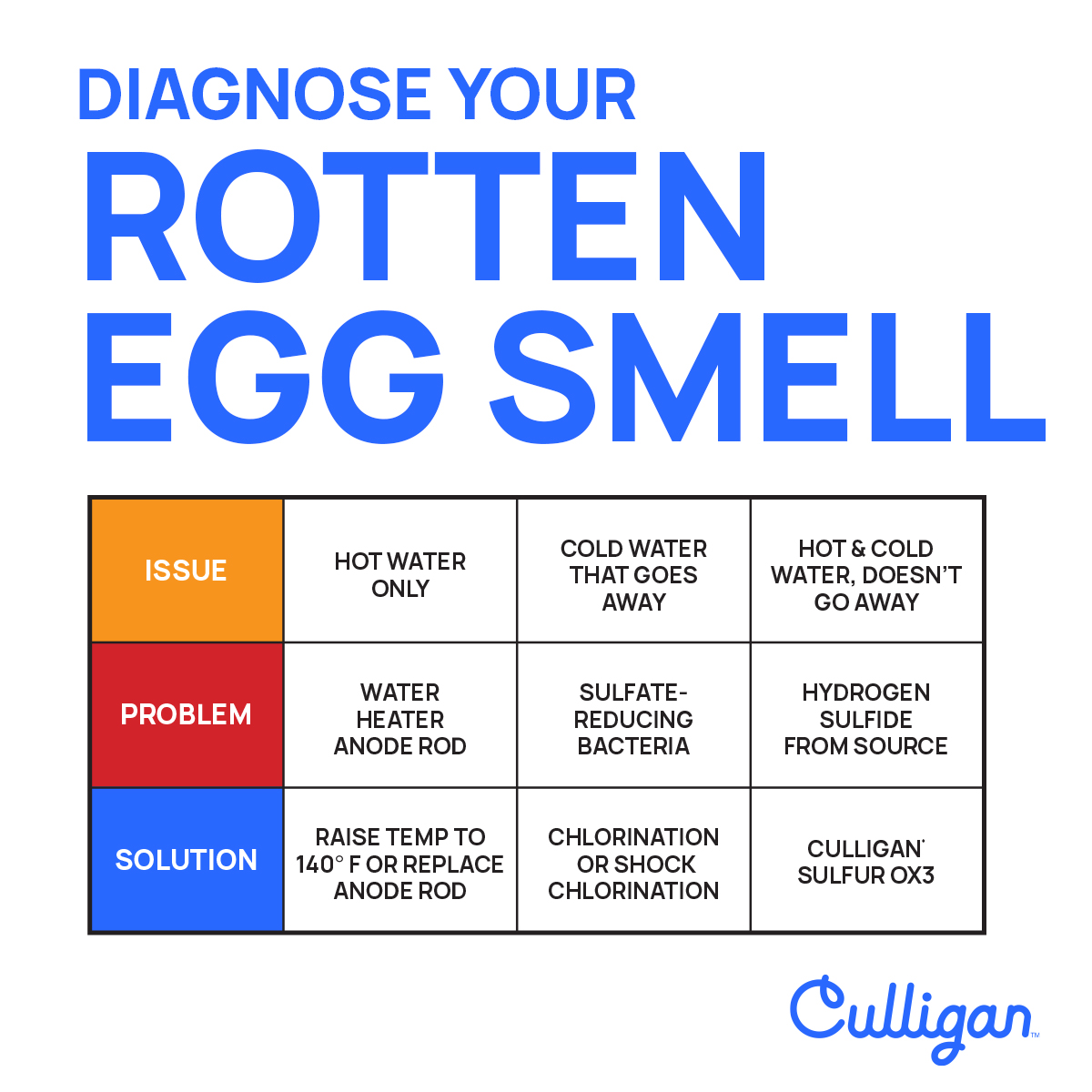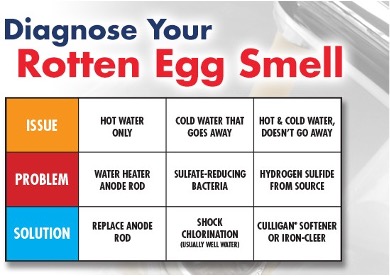Imagine turning on your faucet, expecting a refreshing glass of water, only to be greeted by an unpleasant sulfur smell. It’s an experience many homeowners encounter, and it’s both frustrating and concerning.
This off-putting odor can make you question the safety and quality of your water supply. But what causes this sulfur smell, and more importantly, how can you get rid of it? You’ll discover the reasons behind that unmistakable rotten egg aroma, the potential effects on your health, and practical solutions to ensure your water is fresh and odor-free.
By understanding the root of the problem, you’ll be empowered to take the right steps and reclaim the comfort of clean, pleasant-smelling water in your home. Keep reading, and let’s tackle this issue together, ensuring every sip you take is as refreshing as it should be.
Causes Of Sulfur Smell
Understanding the causes of a sulfur smell in water is essential. It can help identify the source and address the issue effectively. This smell is often compared to rotten eggs, and it can be unsettling. Several factors contribute to this odor, ranging from natural occurrences to chemical reactions. Each cause has its own set of solutions. Let’s delve deeper into these causes to understand what’s behind that pesky smell.
Natural Occurrence
Sulfur is present naturally in groundwater and wells. It is common in areas with high mineral content. Sulfur compounds dissolve in water, leading to the characteristic smell. These compounds are usually harmless but can be annoying. Regular testing helps monitor these natural occurrences.
Bacterial Activity
Bacteria in water systems can produce sulfur compounds. These bacteria thrive in environments with low oxygen levels. They break down organic matter, releasing hydrogen sulfide gas. This gas is responsible for the sulfur smell. Proper sanitation and filtration systems can manage bacterial activity.
Water Heater Issues
Water heaters can contribute to the sulfur smell. Magnesium rods inside heaters react with water, creating hydrogen sulfide gas. This reaction intensifies if heaters are not maintained. Regularly inspecting and replacing the rods can reduce the odor. Temperature adjustments might also help.
Chemical Reactions
Chemicals in water can react, forming sulfur compounds. This includes reactions between sulfates and organic materials. Such reactions are common in untreated or poorly treated water systems. Ensuring proper water treatment and filtration can minimize these reactions. Monitoring chemical levels regularly is crucial.
Identifying The Source
Have you ever turned on the tap, expecting a refreshing drink, only to be greeted by the unmistakable smell of rotten eggs? That sulfur smell in water is not just unpleasant; it can be a sign of underlying issues. Identifying the source of this odor is crucial to restoring your water quality and peace of mind.
Home Plumbing Inspection
Start by checking your home plumbing system. It’s surprising how often the source of the sulfur smell can be traced back to neglected pipes. Inspecting your plumbing can reveal issues like old, corroded pipes or stagnant water in unused taps. Sometimes, a simple visual check can uncover the problem. Regular maintenance helps prevent these issues from developing.
Did you know that your water heater can also be a culprit? The anode rod in the heater can react with sulfate-reducing bacteria, producing hydrogen sulfide gas. Consider checking the condition of your water heater and replacing the anode rod if necessary. A proactive approach can save you from unexpected surprises.
Testing For Hydrogen Sulfide
Hydrogen sulfide is often the chemical responsible for the sulfur smell. You can test your water at home using a simple kit available at hardware stores. These kits provide immediate results, helping you determine if hydrogen sulfide is present. Accurate testing helps you decide the next steps.
While testing, follow the instructions carefully to ensure accurate results. This process might be eye-opening, revealing the extent of the issue. Have you ever wondered how much hydrogen sulfide could be lurking in your water? Testing gives you a clear picture, allowing you to tackle the problem effectively.
Professional Water Testing
If home testing doesn’t clarify the issue, consider professional water testing. Specialists can analyze your water for various contaminants, offering a comprehensive assessment. Their expertise can pinpoint hidden sources of sulfur smell, providing insights that might be overlooked during a home inspection.
Professional testing might seem like an investment, but it can save you time and trouble in the long run. Have you thought about the broader implications of water quality on your health and appliances? Experts bring valuable knowledge, ensuring your water is safe and clean.
Identifying the source of sulfur smell in water is a journey worth embarking on. Your next steps can lead to clean, odor-free water, enhancing your home experience. Are you ready to tackle this challenge head-on?
Health Implications
A sulfur smell in water may indicate the presence of hydrogen sulfide gas, which can cause health issues. Drinking or bathing in such water might lead to nausea, headaches, and eye irritation. Addressing this odor is crucial for maintaining safe water quality at home.
The presence of a sulfur smell in water can raise health concerns. Understanding these implications is crucial for ensuring safe water consumption. While a sulfur odor might seem harmless, it can indicate underlying issues that require attention.Potential Health Risks
Consuming water with a strong sulfur smell could cause discomfort. The primary culprit is hydrogen sulfide gas, which often smells like rotten eggs. Ingesting or inhaling this gas in high amounts can lead to nausea and vomiting. It can also irritate the eyes and respiratory system. While these symptoms are typically mild, prolonged exposure might increase health risks.Safe Exposure Levels
Hydrogen sulfide levels in water should remain below 0.05 parts per million. This ensures it is safe for consumption and daily use. Water with higher levels might need treatment to reduce sulfur concentrations. Regular water testing can help monitor hydrogen sulfide levels effectively. This helps in maintaining safe exposure levels for your household.
Credit: www.cleanwaterstore.com
Short-term Solutions
Experiencing a sulfur smell in your water can be unpleasant and concerning. Fortunately, there are short-term solutions to tackle this issue. These methods can help reduce the odor while you explore more permanent fixes. Let’s explore some quick remedies to improve your water quality.
Flushing The System
Flushing the plumbing system helps remove stagnant water. This method dilutes the sulfur compounds causing the smell. Simply run all faucets and showers for 10-15 minutes. Ensure you include both hot and cold water. This can refresh the water supply and reduce odors.
Using Activated Carbon Filters
Activated carbon filters are effective at removing odors. They trap impurities, including sulfur compounds, from your water. You can install these filters on faucets or use pitchers with built-in filters. Regularly replace the filters to maintain effectiveness. This method provides immediate relief from unpleasant smells.
Temporary Aeration Techniques
Aeration introduces air into water, reducing sulfur odors. You can use a faucet aerator or a simple pitcher method. Pour water back and forth between containers to aerate it. This technique helps release trapped gases, minimizing the smell. It’s a quick and easy solution for temporary relief.
Long-term Solutions
Dealing with a persistent sulfur smell in your water can be frustrating. While quick fixes might offer temporary relief, long-term solutions ensure you won’t have to hold your nose every time you turn on the tap. Here, we dive into some effective strategies for tackling this issue once and for all.
Water Treatment Systems
Investing in a water treatment system is a smart move for eliminating sulfur smells. Consider systems like activated carbon filters or reverse osmosis units. These options remove hydrogen sulfide and other contaminants, ensuring your water is fresh and odor-free.
Think about your specific needs when choosing a system. A point-of-entry system treats all the water entering your home, while a point-of-use system targets specific faucets. Evaluate your budget and household water usage to make the best choice.
Regular Plumbing Maintenance
Regular plumbing maintenance is crucial in preventing sulfur smells from creeping back. Over time, pipes can corrode, allowing sulfur bacteria to thrive. Schedule periodic inspections to catch potential problems early.
Consider hiring a professional plumber to flush your pipes and check for leaks or blockages. You might be surprised how much difference a little maintenance can make. Regular upkeep not only saves you from unpleasant odors but also extends the life of your plumbing system.
Alternative Water Sources
Exploring alternative water sources can be a game-changer for those plagued by sulfur smells. If your home relies on well water, this could be the culprit. Switching to municipal water or installing a rainwater collection system could significantly improve water quality.
Have you ever thought about setting up a rainwater collection system? It’s not just eco-friendly but also offers a fresh, clean water supply. This alternative might require an initial investment, but the long-term benefits make it worthwhile.
Have you encountered sulfur smells in your water before? What strategies worked best for you? Share your experiences and tips in the comments below!

Credit: tampaculligan.com
Preventive Measures
Experiencing a sulfur smell in your water can be quite unpleasant. Luckily, there are preventive measures you can take to keep your water fresh and odor-free. These actions not only ensure a pleasant drinking experience but also safeguard your water supply from potential contamination. Let’s dive into some practical steps you can implement.
Routine Water Testing
Regular water testing is crucial for detecting sulfur and other contaminants early. You can purchase a simple water test kit online or from a local store. These kits often come with easy-to-follow instructions. Testing your water at least every six months helps you stay informed about its quality.
Consider scheduling professional testing annually. Experts can provide a comprehensive analysis of your water, offering peace of mind and detailed insights. Imagine the relief knowing your family drinks safe and clean water every day!
Water Heater Maintenance
Did you know that your water heater can contribute to sulfur smell? It’s true! Regular maintenance can prevent this. Drain your water heater every few months to flush out sediment build-up. This simple task can greatly improve water smell.
Check the anode rod inside your water heater. If it’s corroded, it can cause unpleasant odors. Replacing a worn-out anode rod is an easy fix. Keep an eye on it to ensure your water stays fresh.
Monitoring Water Supply
Paying attention to your water supply can alert you to potential issues before they escalate. If you notice a sudden change in water odor or taste, act quickly. Contact your local water authority for advice or to report concerns.
Install a water filtration system for added protection. These systems can remove sulfur and other impurities, enhancing water quality. Imagine the confidence of knowing your water is filtered and pure.
Are you proactive about water quality at home? Taking these preventive measures can lead to a healthier and more enjoyable living environment. What steps will you implement to ensure your water remains fresh?

Credit: culliganwichita.com
Frequently Asked Questions
What Causes Sulfur Smell In Water?
Sulfur smell in water is usually caused by hydrogen sulfide gas. This gas can form naturally in groundwater or result from bacteria. It often occurs in well water or plumbing systems with organic materials. Identifying the source is key to addressing the issue effectively.
Is Sulfur In Water Harmful To Health?
Sulfur in water is generally not harmful to health but can be unpleasant. Hydrogen sulfide gas can cause a foul smell and taste, leading to potential discomfort. In high concentrations, it may cause irritation but is rare in household water supplies.
How Can I Remove Sulfur Smell From Water?
To remove sulfur smell, you can use water treatment methods like aeration or activated carbon filters. Aeration helps by releasing the gas, while carbon filters absorb impurities. Identifying the source is crucial for effective treatment and ensuring clean, odor-free water.
Can Sulfur Smell Affect Plumbing?
Yes, sulfur smell can affect plumbing systems by corroding pipes. Hydrogen sulfide gas can react with metals in plumbing, leading to damage over time. Regular maintenance and water treatment can prevent corrosion and maintain plumbing integrity.
Conclusion
Sulfur smell in water is unpleasant, but solutions exist. Regular testing helps identify the problem early. Installing water filters can reduce the odor significantly. Consider consulting a professional for persistent issues. Simple fixes may include cleaning pipes or changing water heaters.
These methods improve water quality and safety. A fresh-smelling water source enhances your home environment. Stay informed about water treatment options. Share findings with friends and family. Encourage clean water habits for everyone. Together, we can ensure safe and odor-free water.
Your efforts matter for a healthier community.

Hasan Al Sarker is a Reverse Osmosis Specialist. He has worked for many years to ensure safe drinking water for all. His research paper has been published in several journals, including Issue, Medium, and Slideshare. He is recognized as a water doctor among specialists though he did not attend medical college.
Besides working as a researcher of reverse osmosis technology, he is also very fancy with the kitchen and cooking. His guides are reading thousands of people every day. As a head of content, he is responsible for all the published articles at RO System Reviews.

